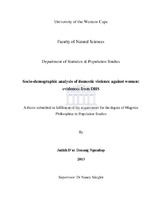| dc.description.abstract | The right for every woman to live free of violence is one of the basic human rights. Nevertheless, this right is still subject to violation on a massive and systematic scale around the world. At least one of three women around the world has reported been physical, sexual and emotional abuse by an intimate partner in her lifetime. Although, gender inequalities and discrimination are considered as the underlying factors of domestic violence, little is known about the contributions of the presence of sons and daughters at home, age, gender, education, marital status, working status, place of residence. Despite the fact that recommendations have been made both at the international and national levels to reduce intimate female abuse, the issue is still rampant in developing countries. The aim of this study was to identify and compare the impact of women’s socio-economic and demographic characteristics on domestic violence across seven countries (Cameroon, Ghana, Haiti, Liberia, Moldova, Nepal and Philippines). Frequencies and bivariate analyses were performed using the latest Demographic Health Surveys from 2005 to 2011. The findings established that on average 33.37 percent of women across the seven countries are abused. Domestic violence is a high concern in Cameroon. The educational level still remains a predicting factor of domestic violence across the countries under investigation except in Liberia. The number of living children was also identified as a predicting factor across the studied countries. Finally, a woman having a son or a daughter at home is more likely to expose the woman to intimate violence in Cameroon, Haiti, Moldova, Nepal and Philippines. All the countries are entrenched in a culture of male domination whereby women lack the freedom
to decide on marital issues. As a recommendation, the government of each of the studied countries should be more proactive in reinforcing judicial system, policies and education that will help to curb the scourge of domestic violence. Furthermore, improving the level of literacy for women and educating men as the perpetrators of domestic violence will go a long way in abating this social ill. | en_US |

